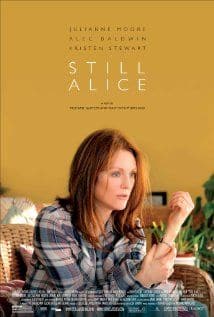Eye For Film >> Movies >> Still Alice (2014) Film Review
Still Alice
Reviewed by: Anne-Katrin Titze

Not entirely a detective story of memory loss, Richard Glatzer and Wash Westmoreland stage an entrancing battle around the power of remembrance and how humans cope by covering up, with Julianne Moore giving a mesmerising performance as Alice, a linguistics professor diagnosed at age 50 with a rare form of Alzheimer's disease.
We are launched into the Howland family with the word "Okay", followed by "Happy Birthday, Mom." It is the mundane as a starting point - a birthday celebration with the family, something that a lot of people can identify with. Based on Lisa Genova's novel of the same name and transposed from Boston to New York, what happens in Still Alice is indeed normal, but not necessarily at the age and under the financial circumstances we are presented with. Alice's charmed life, even before she is diagnosed with early onset Alzheimer's, does not feel charmed, which is part of the film's disturbing aura.

Alec Baldwin, as Alice's husband wants to flee and stay, he fell in love with her mind and can't bear to see it go. The house in the Hamptons, the well-equipped cosy kitchen in the brownstone near Columbia University, the John Robshaw pillowcases and the perfect trench coat all signal, on the one hand, the paragon of East Coast success; on the other, these possessions never seemed emptier of meaning. Kate Bosworth, Kristen Stewart and Hunter Parrish play their children, who all cope in their own way.
Robert Altman's description of the Finnegan family in his film Short Cuts (which featured Moore and Lyle Lovett, whose song If I Had A Boat is prominent in Still Alice) as people who "did everything properly", rings very true for the Howlands as well. Both families have to grapple with the fact that they didn't do anything wrong, that tragedy struck them out of the blue.
Baldwin's performance as John Howland is that of a man half out of the relationship. We see him leave, more often than he returns, Wash Westmoreland pointed out to me during our conversation last month. Yet, the husband is not branded as uncaring, he just can't handle the situation and escapes to a reliable place - his work, which remains unclear in the film. Bosworth, as daughter Anna, wants things to function, closer in the way her father does while Parrish as Tom accompanies his mother when she gives a lecture that features Elizabeth Bishop's One Art. Stewart as black sheep Lydia, who struggles to be an actor on the West Coast, smartly turns out to be the family member most capable of nourishing their mother.
Best Actress Oscar nominee Moore runs away with the film. Alice jogs, and the familiar surroundings of Columbia University, where she has been teaching for years, turn into a foreign landscape. Moore recites with her eyes and permits us entrance into an illness that shakes the foundation of identity.
To "exercise and drink a lot of water," as suggested by a faceless first doctor before the diagnosis, is good advice that makes you shiver because it is so true, so bland and already foreshadows the helplessness of those who want a cure for Alice. Glatzer and Westmoreland team up to meticulously sprinkle the poison of indifference around their protagonist without ever giving the audience the chance to indulge in blame. The doctor, who believes she is a hypochondriac, the department chair, who self-righteously confronts her with bad evaluations, the husband who wants to believe that "it's nothing" - they are simply terribly average.
Stacy Battat's costumes resonate on an emotional, as well as a conceptual level, in a similar way they did in Scott McGehee and David Siegel's What Maisie Knew. The more Alzheimer's disease takes over Alice's life, the more she returns to the tastes of a child. A butterfly necklace given to her by her own deceased mother and a bracelet that informs strangers of her status as "memory impaired" replace her tasteful jewelry. The beige sweater gifted at the start from the children comes back and is not forgotten. We learn that she was honest, it was true, she liked it. Alice sits on the rocks near their beach house in her duck boots and looks out at sea, stating it will be "the last year that I'm myself."
"I shouldn't have had champagne," she lies because of a lapse during a lecture.
Anybody who has ever been at a sudden loss for words in public knows the panic. With the greatest precision one is invited to register the tiniest detail on Moore's alabaster face. With the flutter of an eyelash, a pause imperceptibly lengthened, a duck not recognised as a duck, we cross with her into lands where toddler flash cards become life preservers and certainties of any kind readily float away. How does it feel to talk to your future self who will not remember you?
Ultimately, Still Alice asks questions about control - command over one's own memory becomes a most precious gift.
Still Alice will be screened at the Glasgow Film Festival on February 21 before opening in the UK on March 6. I predict that on February 22, Julianne Moore will be awarded with the Best Actress Oscar.
Reviewed on: 05 Feb 2015


















